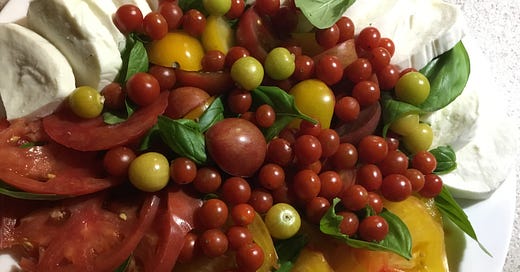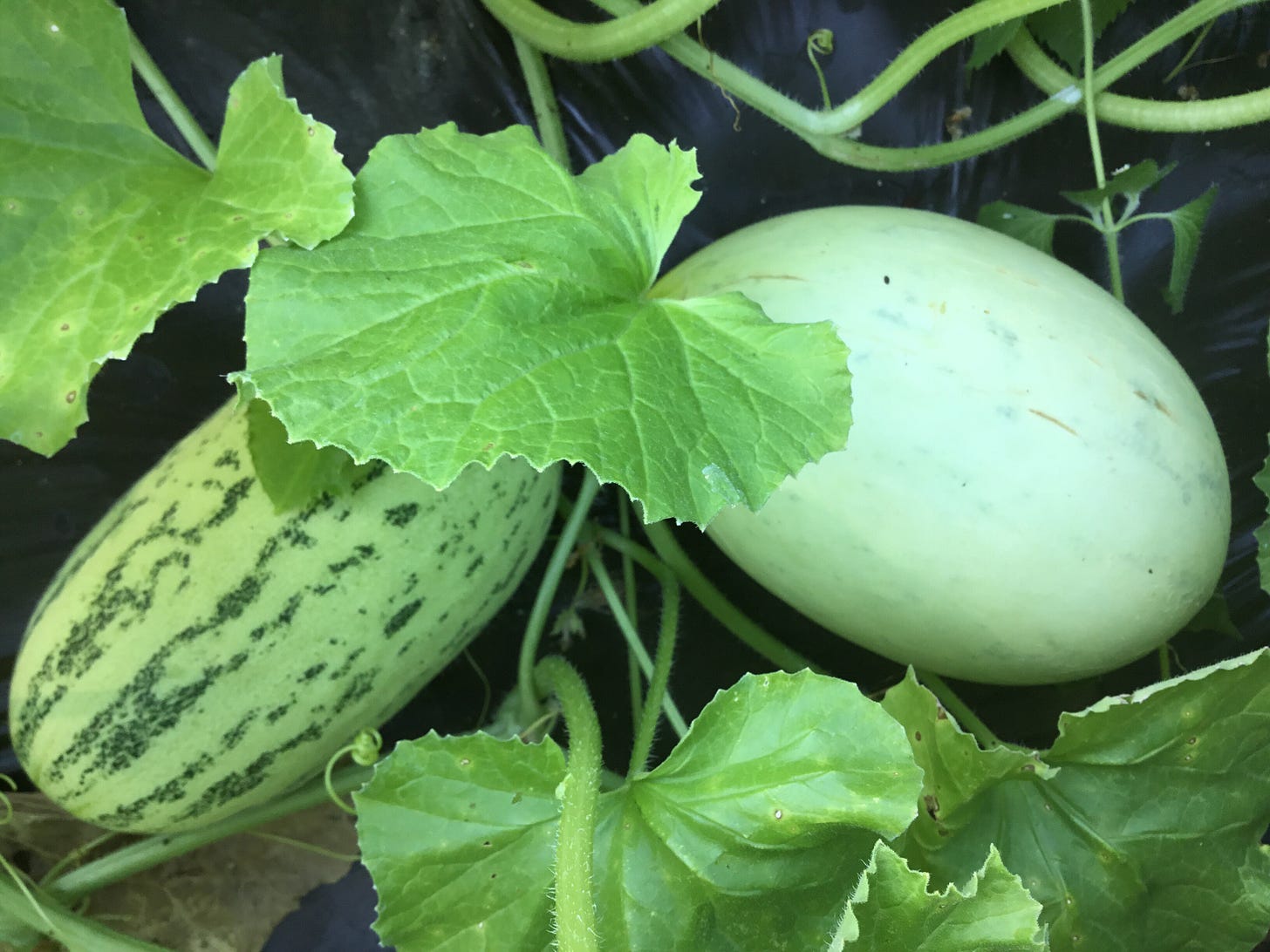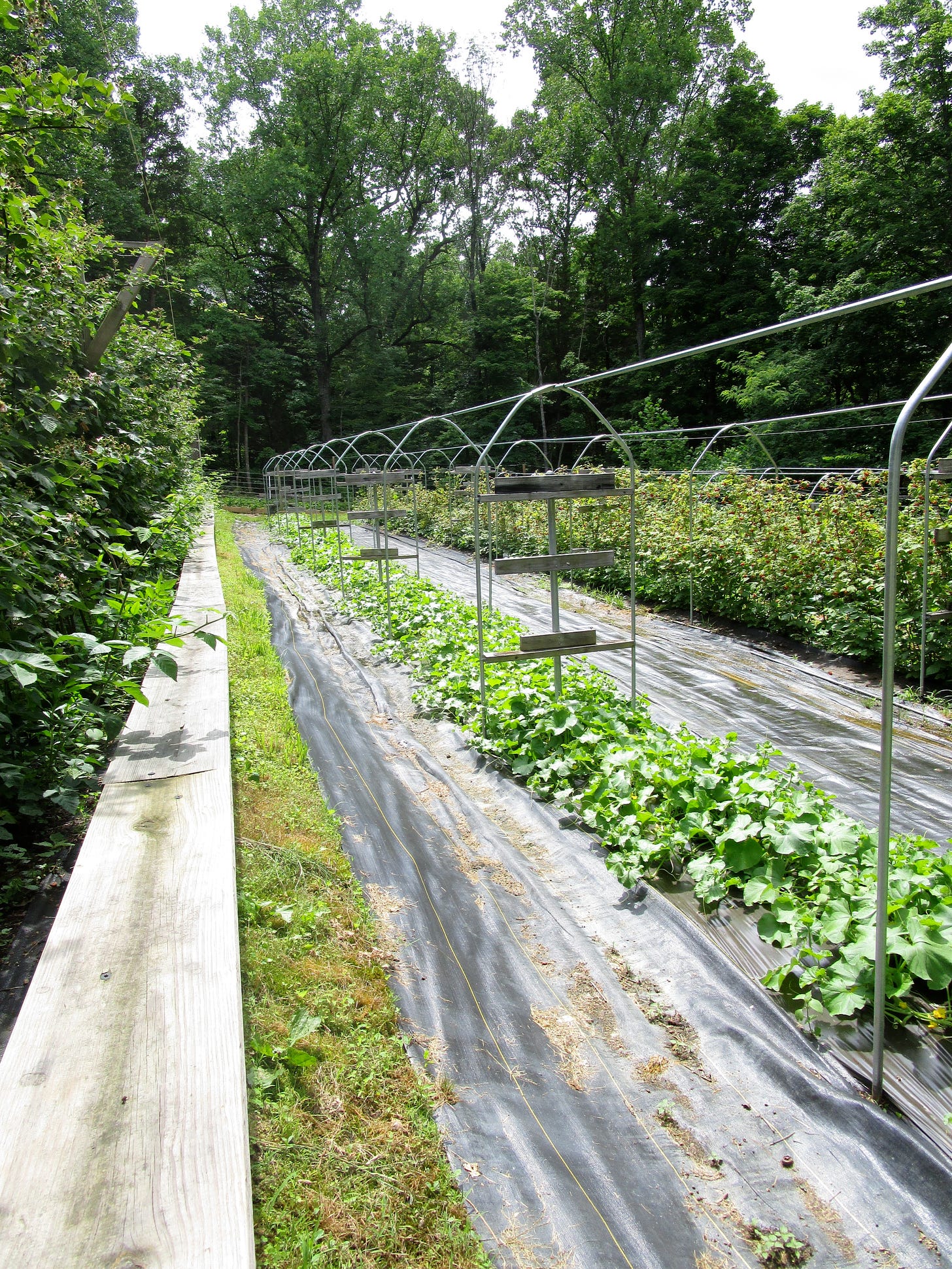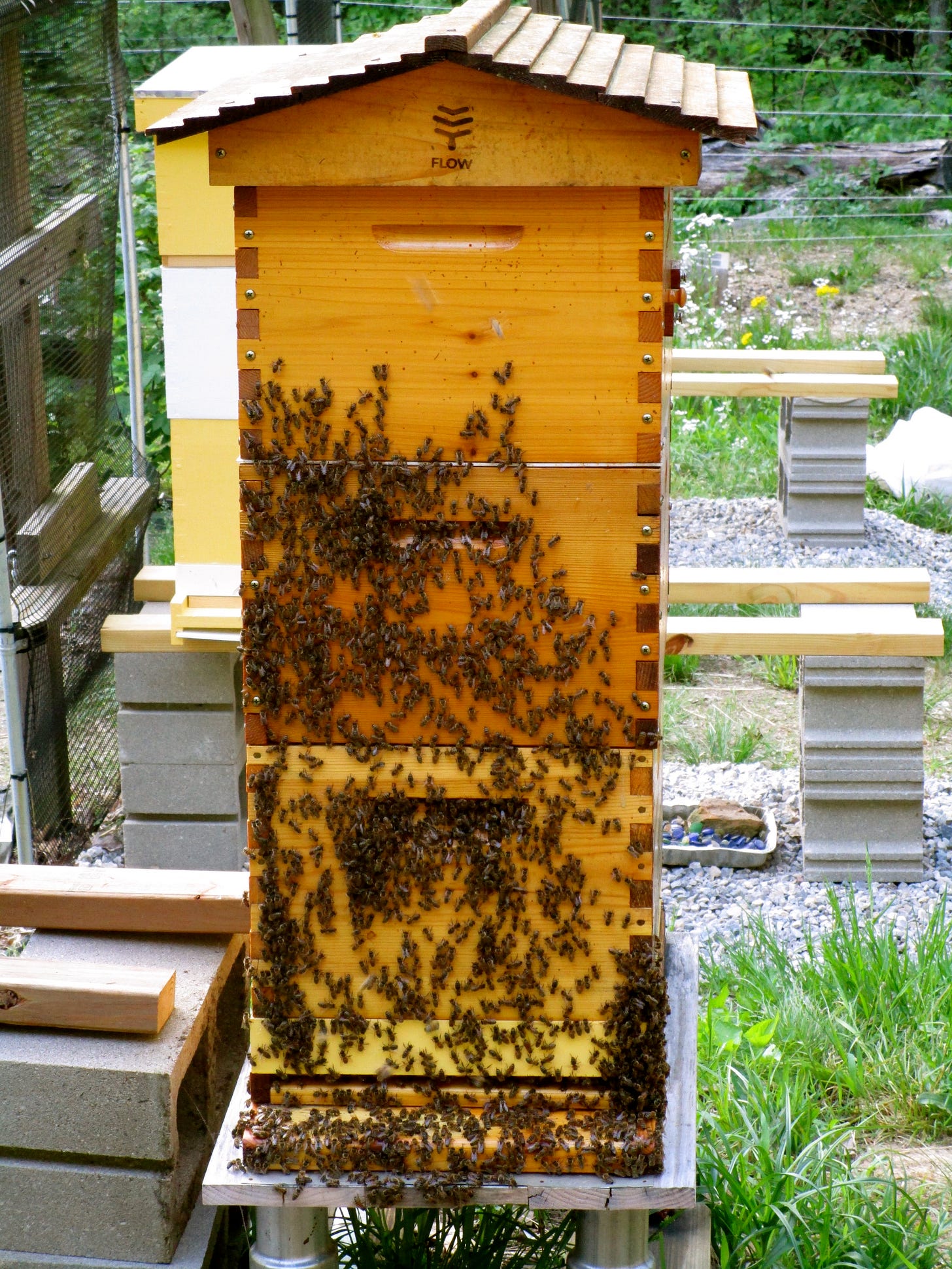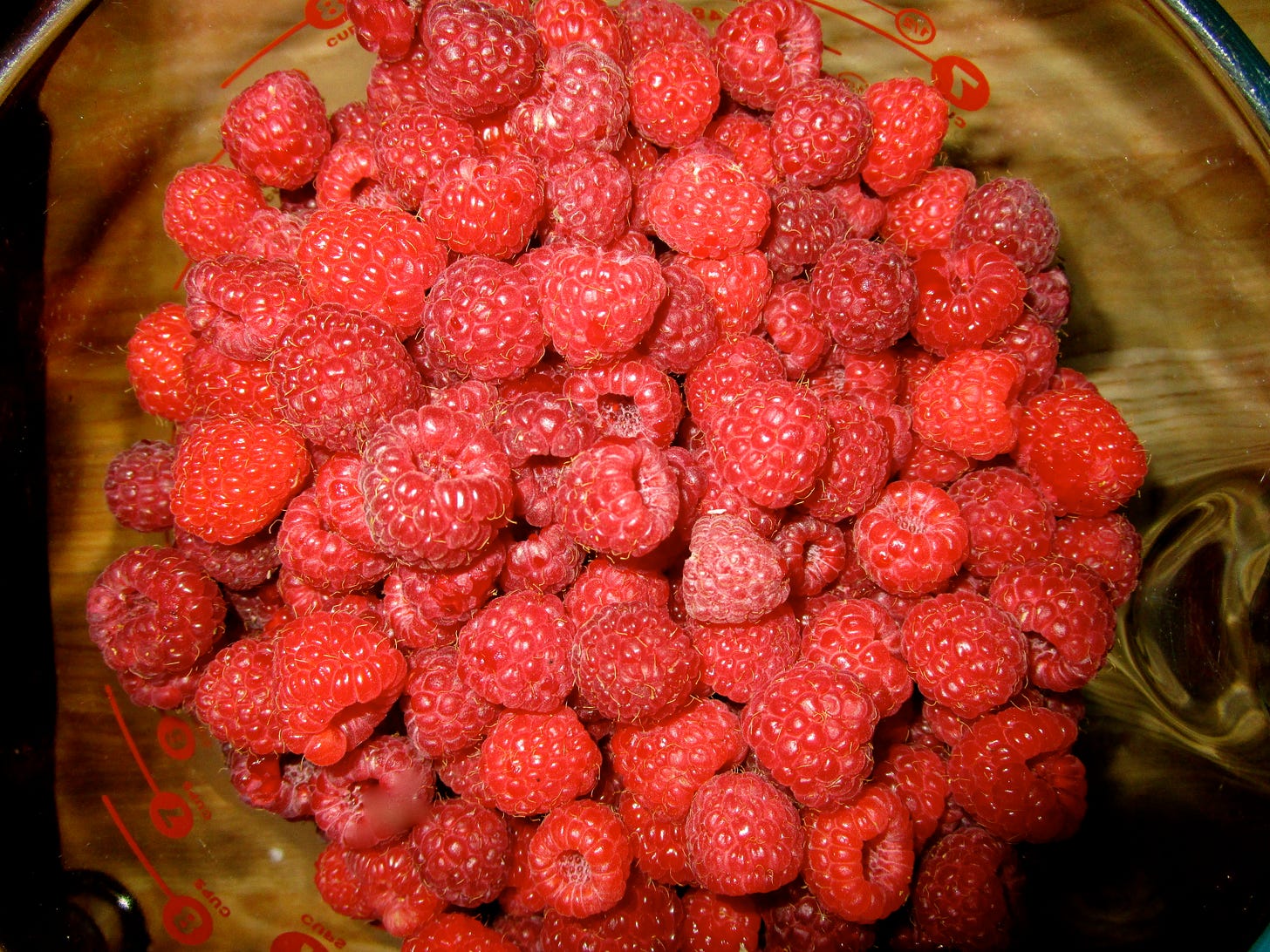The Farmer’s Market: How Much Do You Really Know About Your Food?
Mother Nature will bitch-slap you any chance she gets and then do it again for being stupid about whatever it is you’re trying to do.
When I retired, I bought a ten acre piece of land that we turned into a small heirloom fruit and herb farm. For twelve years we took our produce to farmers markets. The pandemic caused us to quit going to market, thus quit farming for market. We grow our own food and that’s it now. But in those twelve years, I’ve learned a-lot. I now see food system issues with a more informed point of view.
The produce (fruits and vegetables) you buy at the store has traveled many miles. You already know that don’t you?
I bought a melon recently in winter that had a stamp on it declaring that it was from Guatemala. It wasn’t very good. I paid two dollars for it. I’ve grown my own melons and boy are those good. They are ripe in July and August in the midwest. I think what makes them so good is not the idea that it’s a tasty fresh melon, but that it’s a fresh melon that I worked hard to grow. How much do you think that farmer in Guatemala was compensated for his crop of melons?
Did you know the average age of an American farmer is fifty-eight? That’s us Boomers in case you haven’t worked the math. The average age for an organic farmer is fifty-two (more Boomers) and the average age of a beginning farmer is forty-seven.
Whenever I read anything about “climate change” or “green new deal” or “climate smart agriculture”, I cringe.
Policies being made by people who have never grown a thing.
The arrogance of the attitude that humans can change the course of what mother nature plans for us.
Mother Nature will bitch-slap you any chance she gets and then do it again for being stupid about whatever it is you’re trying to do.
Ask any farmer.
“Who controls the food supply controls the people; who controls the energy can control whole continents; who controls money can control the world.” Henry Kissinger
Did you know we already tried Socialism in America?
It didn’t work.
If you go to the Internet and search on “Mayflower Compact Socialism in America” you’re going to find a lot of varying opinions on the idea that the Pilgrims (settlers in American history came on the ship called the Mayflower from England to Plymouth, Massachusetts because of Religious persecution) tried a version of Socialism.
If you just read the text of the Mayflower Compact (The Mayflower compact was the first self governing document in America) you’d never get that idea. It’s only when you combine the idea with William Bradford’s (leader of the Plymouth settlement) diary “Of Plymouth Plantation” that you understand that the Pilgrims written charter(the Mayflower Compact) translated into the idea that there was to be collective ownership, meaning they were going to share the work and what was produced equally (Socialism).
What happened? In two and one half years the community began to fail because what they discovered was that when everything is divided equally, those who are the stronger producers would produce less when they see others not working as hard.
Human nature.
When they went to a capitalistic system, meaning every family could sell or trade with the goods they produced on their own land, there was more output produced (Capitalism) and the colony thrived and survived.
What does this have to do with food?
If you don’t know history, you’ll repeat it.
I remember as a kid seeing news clips of the “Red Guards” in Communist China. The Red Guard was also known as Chairman Mao’s “little generals”. The leader of this communist country knew that he had to get the children thinking the way he needed them to think as adults in order for Communism to grow in China. These children believed that they would die to protect Chairman Mao and many did die in this period. He enlisted them at grade school levels and they were told to destroy anything considered as “old” – old ideas, customs, culture and habits. Called the “Cultural Revolution” (1966-1976), it was the slow death of China as a great country.
The Cultural Revolution brought oppression. Schoolteachers were persecuted, “enemies” of the state were killed, news was controlled, families were controlled and food was controlled.
The sad thing about the Cultural Revolution was it came after what was called “The Great Leap Forward” (1958-1962) a movement in China led by the Communist Party of China. The purpose was to transform the country from an agrarian (relating to cultivated land or the cultivation of land) economy to an industrialist Communist society. What ultimately happened was that thirty million people died from starvation because of the governmental controls placed on the agricultural outputs of the country.
Influenced by the ideals of the Cultural Revolution in China, Pol Pot, the leader of the Khmer Rouge, Cambodia’s Communist regime implemented similar policies. It is estimated that one to two million people died from starvation, overwork or execution under his regime (1975-1979).The Khmer Rouge was one of the most brutal Communist regimes in the 20th Century.
With the Cultural Revolution in China and with the Khmer Rouge, millions died from starvation. The same sort of thing is happening in Venezuela under the Socialist regime of Nicolas Maduro, food is scarce because six million hectares (one hectare is equal to 2.5 acres) was taken from private farmers and placed into the hands of the state so it could control what was grown. Venezuela’s food production fell seventy five percent in two decades, which has led to food shortages there currently.
Today, we have similar things going on in many places, under the guise of protecting the planet.
“Some ideas are so stupid that only intellectuals believe them.” George Orwell
A recent Dutch climate proposal would close up to thirty percent of their farms and force farmers to kill off livestock in order to comply with European Union (EU) environmental rules. When the plan was announced, farmers were given three options: Comply; Relocate; or Shutdown. The Netherlands is the second-largest agricultural exporter in the world, the largest exporter of meat among all EU nations, and the third largest dairy exporter in the world.
Canadian farmers are worried Prime Minister Trudeau’s nitrogen reduction proposal will significantly cut yields to canola, corn, and wheat.
South Africa, the world’s second largest exporter of fresh citrus after Spain, filed a complaint with the World Trade Organization last month after the European Union introduced new plant and health safety requirements that orange farmers say threaten their survival. The measures came into force in July as ships were already at sea carrying hundreds of containers full of South African fruit to Europe, resulting in them being held up on arrival. Oranges are perishable.
The Irish government made climate standards more stringent, one farmer described that it “made whole classes of farms unviable.” Ireland exports barley, beef, butter and cheese.
Sri Lanka embraced this “green approach” when the government banned the use of chemical fertilizers to “protect the soil and biodiversity.” As a result, crop production fell thirty to fifty percent, and presently the country is in disarray. The Sri Lankan people are starving, the economy is collapsing.
The Biden administration is also pushing “climate smart agriculture”. One definition: Climate-smart agriculture (CSA) may be defined as an approach for transforming and reorienting agricultural development under the new realities of climate change.
See the pattern?
When we were in our twenties, “they” tried to scare us about the end of the world coming from a nuclear holocaust. A nuclear holocaust caused by Russia launching nukes on the United States or vice versa. It was everywhere, the scare about nuclear weapons, power plants, nuclear destruction and then the horrible radiation sickness that comes after. We had drills in grade school where we dove under our desks to hide from nuclear blasts and fallout. What kind of message did that send? How were desks going to protect us?
It was the best fear mongering they could come up with then.
These types of messages were peppered in just about everything you read, movies you saw, much like the threat to the planet and ever changing climate the millennial generation is exposed to. It was pretty scary stuff to us then.
The nuclear holocaust never came because you could see who the “enemy” was and what it was doing.
It’s why a lot of people our age aren’t too alarmed about the climate change/global warming/inconvenient truth bunch. “They” have already tried to scare us with end-of-world scenarios. It’s not because we’ve over polluted the planet or used all the resources. It’s the same type of scare tactic that keeps getting reused – to control behavior.
Except you can’t see or control this enemy, making it all the more powerful.
Today this sort of thing is a little more insidious and it starts with story time in preschools and has taken it even further to the point where the millennial generation is afraid to have babies. How’s that for control?
If anyone really thinks we humans have any control over what Mother Nature decides she’s going to do, go talk to a farmer.
You can’t live life with “what-if” doomsday scenarios, otherwise, you won’t live your life, you’ll just live out the fantasies of someone else.
In getting back to the farmer’s market, walk around a market, look at the farmers there, these small family farms will cease to exist if “climate smart agriculture” is implemented in the United States. Small farms cannot comply with the regulations governments are putting in place in the Netherlands, Canada, Ireland, Sri Lanka and Venezuela and won’t be able to in the United States.
Farmers grow the food we eat. When they cease to exist, so will you.
If you’ve ever driven through American farm country, I hope you’re amazed at the bounty. Farmers in the Midwest, the South, California, Michigan, Florida all produce the food you consume. Many countries cannot grow the food we do. Think a minute about that and marvel at what American farmers do.
Our food system is complicated. There are many regulations that guide what farmers are and are not allowed to do and they are getting more draconian with each wave of “climate change” “fixes”. Some small family dairy farmers in America can barely pay the bills with what little profit that comes from their cows because of the regulations. I often wonder why they keep doing it at all. Some of them are quitting the business leaving the huge corporate (think Driscol’s, Ocean Mist, Dole) farms to monopolize the farming industry. Corporate farms grow crappy melons.
Farming doesn’t work outside of a capitalist society. Nor does it work in a monopoly (a system where one or few entities controls the entire industry). Farms flourish in free market capitalist societies. Whoever has the best product makes the most money and becomes the most successful, just like those pilgrims did in Plymouth in 1620.
Small farms typically have the most to lose, so they’re the ones who will most likely have the best product. When they fail, the corporate farms buy the land up and implement their “factory” farming. Corporate farms do not produce the best product. Small family farms do and they are disappearing as the Boomers retire.
Our farm was biodiverse. Biodynamic farming methods all work off the concept that a farm is a site-specific ecosystem. Biodynamic farming is a holistic system that places importance on all of a farm's elements: soil, water, plants and animals. These methods rely heavily on soil building, water conservation, composting, animal production and animal by-products. In my opinion this form of farming is far superior to those who claim to be “organic”.
If you are paying for organic food at the farmer’s market, you’re getting ripped off.
Once organic farming was “organic”, today is a system of farming highly regulated by the USDA (United States Department of Agriculture). These farmers do what the government tells them to do and generally it’s pretty unreasonable and expensive for the farmer. The corporate farms also game the system just so they are able to claim “organic” and charge the very high “organic” rates. Friends of ours who had been organic farming for well over twenty five years dropped the certification in 2010 because of the unreasonable demands that did not improve the quality of the produce in any way, it just cost more to produce. If you don’t believe what I am telling you do a search for yourself, but dig deep, this is a dirty little secret.
So in getting back to how much do you know about your food?
Let’s take a trip to the farmer’s market.
Eat a country steak. Cow farts are not destroying the planet. Really.
Meat that you get directly from the farmer tastes better than what you get at the grocery store.
Why?
Grocery stores are required to use a lot of bleach and that’s exactly how the meat ends up tasting. We used to make herbal grilling rubs in windowed tin boxes because of this. We sold hundreds of four dollar tins.
If you’ve never tried a country steak, you’re in for a treat and a revelation.
Meat from small farms, that is processed by small family butchers will taste better than what comes from corporate farms, think Tyson, Smithfield, Perdue.
You’re going to find that some of the meat farmers that come into a city for a farmer’s market are going to charge some pretty steep prices. Those prices may be justified and they might not be. We had a farmer at our farmer’s market that drove a very fancy rig to carry his freezers of meats and grills. He was certified organic. He came to market with great fanfare, two tents, big Traeger grills (they sold five dollar, 4oz sliders as well) and hung up expensive signs with expensive prices. He would joke and laugh that he had his customers trained to pay his exorbitant prices. This farmer also put out a newsletter to his customers that described every aspect of his farm life, including the costly mistakes he made, the half million-dollar farmhouse renovation, the in ground pool and new expensive farm equipment. Who do you think is paying for these things?
Then you’ll have the farmer who comes to market with his freezer in his well used pickup truck that utilizes a chalkboard to list his somewhat reasonable prices.
Which meat is going to taste better?
You won’t know until you try both, but my experience has been that the humbler of the two examples is going to have the best product.
That will be true with most of the other items you’ll find at the farmer’s market.
If one is spending time on flash, especially if it’s a farmer, one isn’t spending time making the actual product the best, are they?

